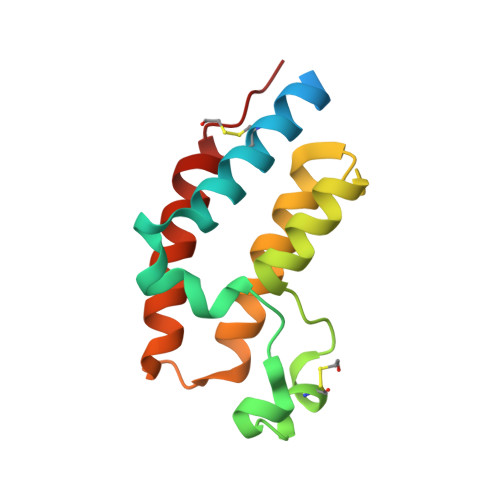Structure-Based Discovery of CF53 as a Potent and Orally Bioavailable Bromodomain and Extra-Terminal (BET) Bromodomain Inhibitor.
Zhao, Y., Zhou, B., Bai, L., Liu, L., Yang, C.Y., Meagher, J.L., Stuckey, J.A., McEachern, D., Przybranowski, S., Wang, M., Ran, X., Aguilar, A., Hu, Y., Kampf, J.W., Li, X., Zhao, T., Li, S., Wen, B., Sun, D., Wang, S.(2018) J Med Chem 61: 6110-6120
- PubMed: 30015487
- DOI: https://doi.org/10.1021/acs.jmedchem.8b00483
- Primary Citation of Related Structures:
6C7Q, 6C7R - PubMed Abstract:
We report the structure-based discovery of CF53 (28) as a highly potent and orally active inhibitor of bromodomain and extra-terminal (BET) proteins. By the incorporation of a NH-pyrazole group into the 9H-pyrimido[4,5- b]indole core, we identified a series of compounds that bind to BRD4 BD1 protein with K i values of <1 nM and achieve low nanomolar potencies in the cell growth inhibition of leukemia and breast cancer cells. The most-promising compound, CF53, possesses excellent oral pharmacokinetic properties and achieves significant antitumor activity in both triple-negative breast cancer and acute leukemia xenograft models in mice. Determination of the co-crystal structure of CF53 with the BRD4 BD1 protein provides a structural basis for its high binding affinity to BET proteins. CF53 is very selective over non-BET bromodomain-containing proteins. These data establish CF53 as a potent, selective, and orally active BET inhibitor, which warrants further evaluation for advanced preclinical development.


















